Toyin Falola

A DISCUSSION ON Biographies, PART 1
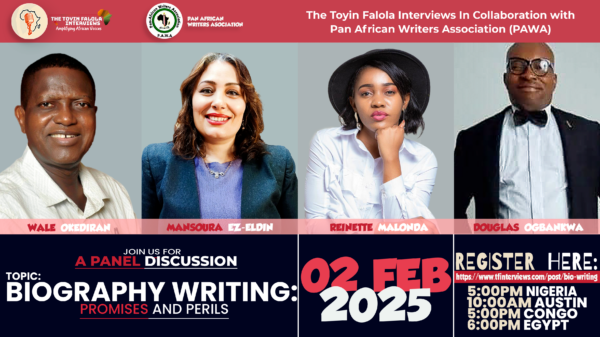
Biographical writing constitutes a category of literary engagements that are explored in academia because they are helpful in revealing the network of events that make up the human world. As a genre of literature that deals with the documentation of human journeys and experiences by another party, it is both an exercise that demands a measure of creativity and a sprinkle of scribal expertise and competence. But more than this, biographies are documentation that enables us to understand the intricacies of sociocultural networks and the dynamics of human political, economic and epistemic traditions which underlie their identity.
We should immediately beam a light on the former before coming to interrogate the latter. As a creative enterprise, writing biographies demands a reasonable number of primary sources because it is the professional responsibility of the biographer to have sources which would inform them about important episodes of their subject’s lifestyle, career and challenges which the subject may not be particularly interested in revealing by themselves. Although the individual for whose biography is written is considered the primary source in literature, then again, certain individuals and groups with whom they share very compelling history can serve as primary sources who experience firsthand how the individual leads their life from a time of ignorance through to the period of gradual consciousness and awareness. This is considered necessary for a number of reasons. For one, it is often difficult, if not outright impossible, for individuals to have a clear recollection of the events of their life from childhood to their current status.

Parents of such individuals whose lifestyle is deserving of biographical documentation would also serve as sources, although secondary ones, that would share information about the subject in order to shed light on critical areas that need appropriate unraveling. The ability to weave the chains of events into an interesting story depends largely on the creative ingenuity of the author, who would structure the experiences and events of the lives of their subject in ways that would attract the audience’s attention. It should be emphasized that unless stories are woven into creative bits, they will be bland and uninteresting to listeners who have experienced similar things in the course of their social evolution. Meanwhile, there are turns of events and angles of experiences that occur to every human in the course of their development, but unless these are expatiated and garnished with narrative expertise, the story of everyone would be boring, and this explains why it is usually necessary to contract out biographical writings to people who have this touch of avant-garde literary genius so that they can help to bring alive the underrepresented aspects of the human experiences that deserve mentioning in the writing of these works. Any successful biographer would explain to anyone who cares to listen that sometimes they must have access to documents, records and other materials that give proper perspectives about the subject to be written about. It is in this intellectual Odyssey that they would discover various things that would be of immense importance for the handing down of the story.
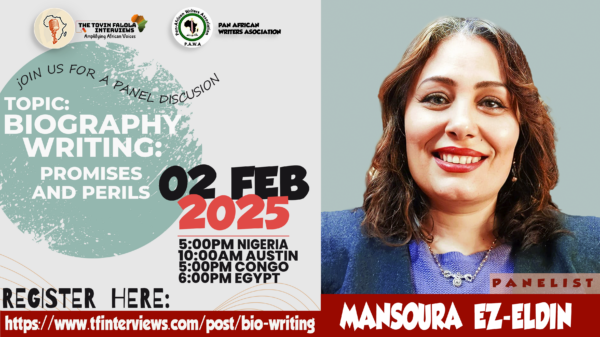
Writers generally, regardless of the genre they are writing about, have always faced the problems of plot structure in their works. Oftentimes, the type of plot that an author uses often determines the level at which they would sustain the interest of their audience or readers. Biography writers, however, are always encumbered in the quagmire of making choices between chronologically arranging the subject’s history or doing so episodically. They cannot escape this travail given the fact that each plot structure often determines how well they would be able to garnish the writing with suspense, which in itself can drive more readership to their work.
Meanwhile, the original events in human life happened chronologically, but then nature does not pick any interest in creating suspense in human life. Nevertheless, it is also complicit. It is the complicity of nature, for example, that leads to people having to lose hope about things around their existence and give up on their further engagements, but somehow and sometimes, they experience “miracles” and unexplainable surprises that turn their life around into something exhilarating and terrific at the unbelievable hour.
I give an example in the life of General Olusegun Obasanjo, an erstwhile President of Nigeria, who was facing mortal danger of losing his life but, in a twist of fate, became in 1999 the most sought-after candidate to ascend to the highest political office in the country―ironically, the same position that someone used to persecute him. That moment creates suspense in his life, and a good biographer owes us the responsibility to create intensity when relaying that side of his life to people.
You would agree with Obasanjo’s biographer that it is in this unravelling of human ingenuity and creative genius that biographies expose thematic concerns that would altogether contribute to human knowledge about things. Need I mention that biography writings are specifically reserved for people whose life is evidence of successful processes, and not usually people without landmark achievements? This is the case not because there is nothing to learn from less successful individuals who occupy the cultural and political landscape with others, but because as much as they have a large deposit of instances of strives and struggles which amounted to little, they lack a sizeable signifier of evidence from which others must learn and develop themselves. Should we not rethink the association of success or infamy with biographies?
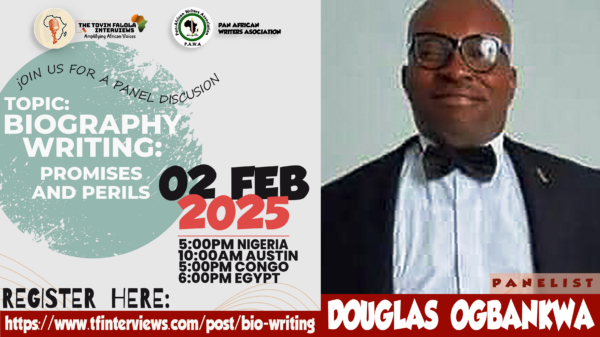
It is in the narration of the subject’s triumph that people get the thematic inclinations of a text, and there is a place where they learn about the intricacies of life and the travails of human existence. It cannot be overemphasized that themes are the solid lessons which we draw from the life of an individual or societies handed down through creative writers. I picture the lifestyle and trajectory of that noble African revolutionary, Nelson Mandela, an erstwhile President of South Africa, and deduce from his biography that success requires uncompromising dedication and determination, regardless of the time and season.
It should not be forgotten that I highlighted biographies as documents that enable us to understand the intricacies of sociocultural networks and the dynamics of human political, economic and epistemic traditions, and here is what I mean. Writers are indeed powerful but there is a limitation to which they can exercise their authorial freedom. Of course, it is not that they are bound by any existential rule that restricts them on what they should or can do when they hold a pen, but the limitation of writers inheres in how they cannot force the interpretation that a text makes itself when they become a perfected product. For illustration, while the intention of the biographer may not be to expose the cultural or political dynamics of a people, informed readers can begin to understand unsaid stories and practices among the people about whom the stories were written. For instance, the resilience displayed by Mandela in that biography portrays a thematic focus that emphasizes human determination to actualize their objectives, but then the unsaid story is the suppression of human freedom that was done by an imperialist fraternity, collaborated with by some internal forces, among other things. It speaks to the perpetual onslaught of the people’s sociopolitical identity for extractive reasons and how a colonial power would never back down in pursuing their provincial intentions.
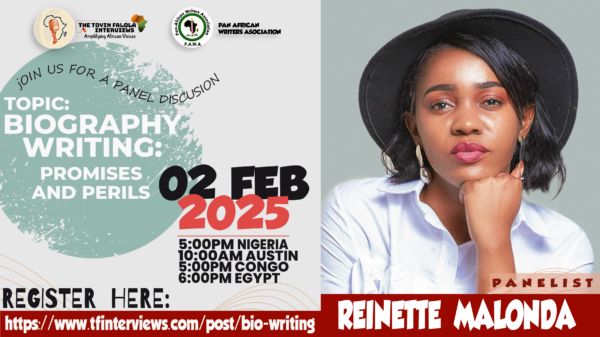
How about the frailty of anarchy in a fragile environment such as Nigeria, the revelation of which would be accessed in the biography of Obasanjo, who was persecuted for no obvious legal mistakes but because some feudal groups in the country were hellbent on making an example of anyone who dared question their power or authority?
All these things are eternally interwoven in biographical writings, and it is expedient that we begin to accord them the necessary literary attention so that we can understand the grey areas which are not commonly given the highlight that they need.
Please join us for a panel discussion with our distinguished panelists, Dr Wale Okediran, Mansoura Ez-Eldin, Douglas Ogbankwa Esq, and Reinette Mulonda, who will be sharing their expertise on “Biography Writing: Promises and Perils” on:
Sunday, February 2, 2025, 10 AM Austin 5 PM Nigeria 6 PM Egypt
Register Here:
https://www.tfinterviews.com/post/bio-writing
Join via Zoom:
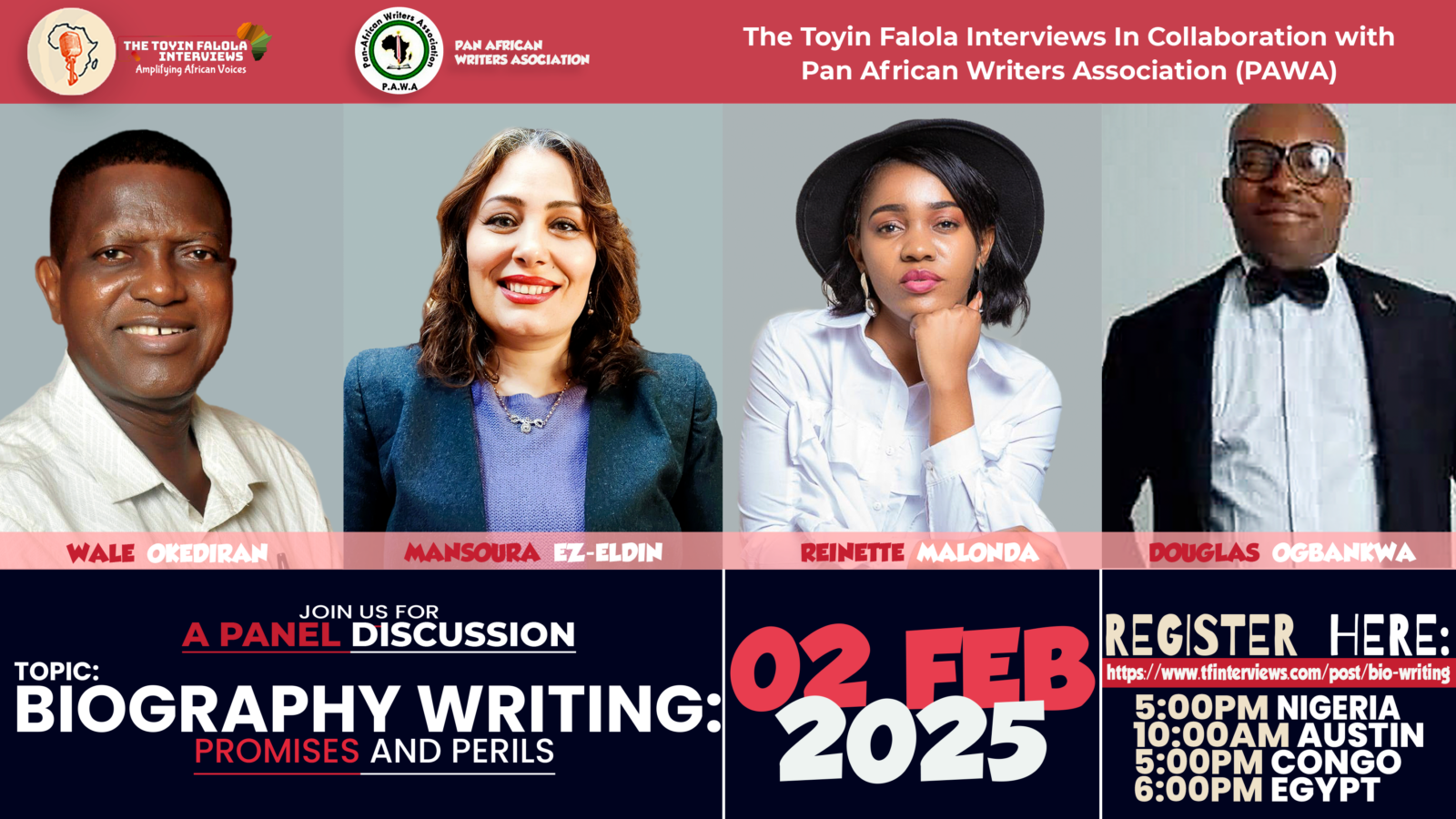
I accept to participate. Please keep me posted
Very informative